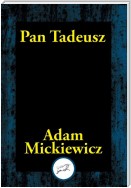Adam Mickiewicz

Adam Bernard Mickiewicz [mit͡sˈkʲɛvit͡ʂ] ) (24 December 1798 – 26 November 1855) was a Polish national poet, essayist, translator, publicist and political writer. A prime representative of the Polish Romantic period, he is one of that country's Three Bards and the greatest poet in all Polish literature. He is also considered one of the greatest Slavic and European poets. He has been described as a "Slavic bard". He was a leading Romantic dramatist and has been compared in Poland and in Europe to Byron and Goethe. He is known primarily as the author of the poetic novel Dziady and national epic Pan Tadeusz, which is considered the last great epic of Polish-Lithuanian noble culture. Mickiewicz's other influential works include Konrad Wallenrod and Grażyna. All served as inspiration during regional uprisings and as foundations for the concept of Poland as "the Christ of Nations." Mickiewicz was active in the struggle to achieve independence for his homeland, then part of the Russian Empire. Having spent five years in internal exile in central Russia for political activities, he left the Empire in 1829 and spent the rest of his life in emigration, like many of his compatriots. He settled first in Rome, later in Paris, where he became professor of Slavic literature at the Collège de France. He died, probably of cholera, at Constantinople in the Ottoman Empire, where he had gone to help organize Polish forces to fight against Russia in the Crimean War. His remains were later moved to Wawel Cathedral in Kraków, Poland.
 čeština
čeština Deutsch
Deutsch français
français magyar
magyar polski
polski русский
русский English
English Azərbaycan
Azərbaycan беларуская
беларуская italiano
italiano ქართული
ქართული қазақ
қазақ Nederlands
Nederlands português
português slovenčina
slovenčina español
español 中文
中文










